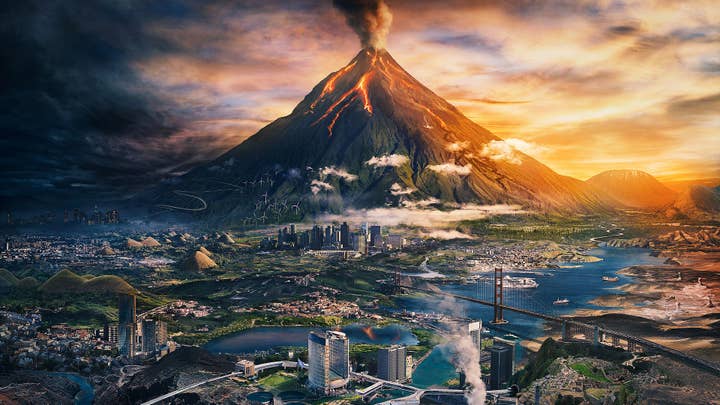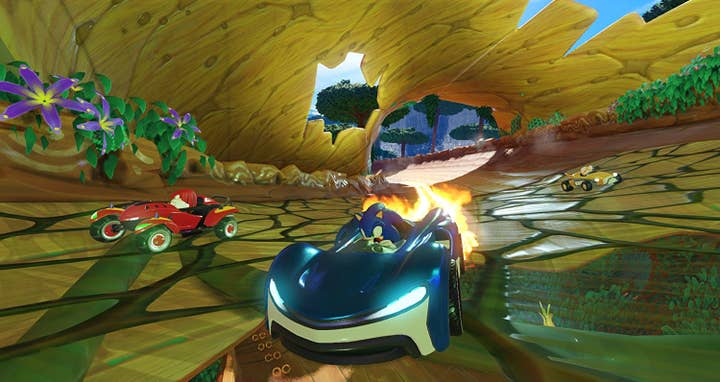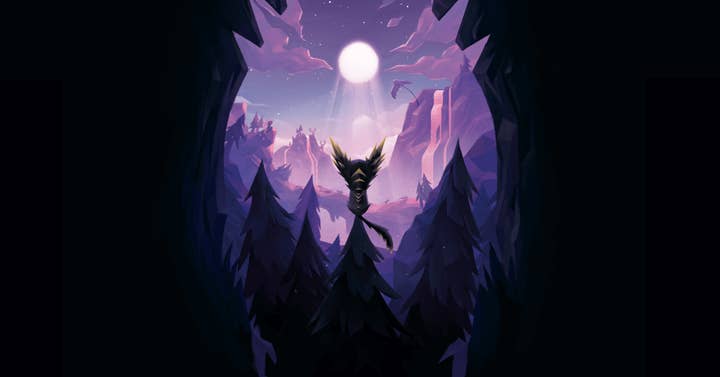Eight ways your games can inspire climate action
“I want to see games trade material growth for social growth,” says Fe designer and climate activist Hugo Bille
There is a disconnect between people and reality when it comes to climate change. We've all seen the reports heralding the death of human civilisation at our own hands, yet culturally we compartmentalise it as a "problem for the boffins."
But 2019 has been the year of climate action. All around the world millions of schoolchildren have been striking for climate justice, movements like Sunrise and Extinction Rebellion have been making headlines, cities and even entire countries are declaring a climate emergency, and there is a newfound momentum behind our collective desire to not drown/burn/starve when nature turns against us.

Speaking at Nordic Game 2019, Hugo Bille lays out eight ways which games can inspire climate action from an artistic and design perspective.
"I do not wish to imply that making games is an appropriate response to the challenges facing our civilisation, because our civilisation is basically waging a war on nature and we're winning," says the climate activist and designer of Fe, an EA Original title launched last year.
"Not only are we driving the first mass extinction event in 66 million years, we're also geo-engineering our atmosphere by burning fossil fuels to a point where global warming is starting to feed itself. Most of us are still quite comfortable about these things; I don't think we have yet collectively woken up to the fact that we are waging war on ourselves, and on the very conditions that allow our civilisation to function or even exist."
However, Bille argues that game creators have an important role to play in the fight against climate change. It's a war of hearts and minds.
"It's kind of inevitable that as creators we reflect our culture," says Bille. "We make games about the things that are on our minds. We reflect culture and, in doing so, we magnify. So I basically ask that we start thinking about what parts of our culture it is that we magnify."
This is, Bille caveats, not an exhaustive list: "I just want to get the conversation started about the ways we can use the rich and complex languages of video games to start talking about things that we need to start talking about."
Portraying the system
Perhaps the most obvious avenue, it's also the one way which likely appeals to game designers the most. Plenty of edutainment games like Chris Crawford's Balance of the Planet have portrayed systems such as global warming, but it's also started to appear in mainstream strategy games like Civilisation VI: Gathering Storm, which has models environmental factors like sea-level rises.
In essence, designers need to find a "balance between playfulness and truthfulness" when creating a virtual world which follows the rules and dynamics of a real-world system like the climate or global economics.
Strategy titles are the obvious medium for games to portray systems in this way, but Bille suggests that roguelikes also present fertile opportunities.

"Roguelikes especially have freed themselves from a few annoying power fantasy tropes that make ecosystems harder to model than in other genres, without sacrificing the fun," he says. "Mainly, a lot of environmental problems are about delaying consequences, about the problems that we can't solve in a good way any more because we should have done it 20 years ago, and that's a games design taboo...
"Roguelikes kinda sidestep this, because that's exactly the kind of game play people come to this genre for. It's okay to paint yourself into a corner in roguelikes. For example, I waited a full winter in Don't Starve for the walruses to appear, only to realise they won't because I killed all the cubs last year. That's exactly the kind of chilling surprise that people voluntarily come to this genre for."
Systems can be portrayed in other genres, however, like 2008 adventure game The Void. Bille describes it as "perhaps the most ecologically truthful games I've played," but it runs into problems with the accessibility of its message.
"It's so veiled in metaphor... It's up to each and every one of us to find our place on this scale between Battle for the Planet in your face eco-edutainment and... abstract art," says Bille. "Find the place where we're comfortable as creators, and where our audience is comfortable."
Climate fiction
Much like the industry's portrayal of race and gender, Bille argues, critics will begin to hold games accountable for how they handle environmental issues.
"As we use games to imagine the future, as we so often do, it's no longer credible to leave climate and environmental degradation out of that picture," he says.
It's an area which has been explored in literature for many years, with the science fiction sub-genre cli-fi (climate fiction). While dystopian explorations seem like the most obvious in this genre, Bille suggests games can be used to "imagine the world we want, instead of the one we fear."
"Imagine the world we want, instead of the one we fear"
"After all, what does a sustainable world even look like?" he adds "Can you imagine it? That's a huge creative task ahead of us. But I think games can make us long for the future...It doesn't have to be utopia. Any reasonably credible vision of a society that isn't at war with nature, is just going to be gobbled up by an audience that is deprived of hope at the moment.
"That's not to say that dystopia doesn't have a role to play. I find it serves two purposes: one of them is to take us closer to the fires and the famines and the wars and the social collapse that await us in a rapidly warming world. Some would call that alarmism, I would say that there are already too many people that believe that global warming is a problem for polar bears and we kind of past that junction 20 to 30 years ago... [The second is that] post apocalypse can help us understand how to cope with all sorts of broken worlds."
Interactive satire
Modern video games have a very particular sensibility, Bille says, from having grown up in a "wholly unsustainable extractivist civilisation" of the 1970s. His argument here is that games have picked up the unhealthy habits of the past, and have "never known a time when we weren't wrecking the planet."
"Our first hero, Pac-Man, starred in a game about literally consuming everything on screen, and we've kept going like that," he says. "Practically every game is about mindlessly extracting every single resource you can get your hands on, and the environment doesn't care because the environment is invulnerable and everything respawns. The world exists solely for the player's benefit. Most roleplaying games encourage us to just hoard stuff that we're not actually gonna use because it feels good to pick stuff up, and there is no item deterioration or weight limit.
"Our first hero, Pac-Man, starred in a game about literally consuming everything on screen, and we've kept going like that"
"I find that many games and some whole genres are just so deeply entrenched in the 20th century ideal of extractivism and eternal growth that they don't have much potential to... inspire any positive change for our world. But that might be a good thing in itself, because many of them are just a small change in tone from becoming poignant, political satire, with stories that can highlight and contrast the absurd nature of their mechanics and systems."
The example Bille draws on here is Oiligarchy, a browser game about growing your oil empire through political corruption. While a compelling enough experience on its own, the satire comes less from the act of plundering Earth's resources, and more with the deadpan tone and grim acceptance of it all. "It's really hard for a simulation itself to be critical of the system it portrays, especially if it's going to be fun at the same time," says Bille. "But if there is a written story that contrasts it, and actively highlights how bizarre the system is, then you might get something like Oiligarchy."
Normalising eco-consciousness
This is something almost every game developer can do. Some, like Motion Twin, have even used it to generate publicity for their games, like when the Dead Cells developer announced there was a vegetarian option in the game for healing items.
While obviously not an earth-shattering feature that reshapes how we think about industrial meat farming, it does normalise vegetarianism in the cultural consciousness, in the same way that sensitive portrayals around gender, race, sexuality, physical disability, or mental health can help tackle stigma. It's not a solution in itself, but it can be part of a wider effort.

"It's going to take tens of thousands of games and movies and books saying the same thing to even start this shift to a new normal," says Bille. "The good news is it requires very little from each of us, and this is the part where every single game is able to pitch in in some way....
"We can start by writing stories about people who care, and crucially about men who care. Because right now there are some really nasty norms out there, presenting caring about nature as something fundamentally unmanly, and those morals need to go right now. I want to at the very least see a ruthless professional killer in a game that is really really picky about his own personal carbon footprint.
"I think it's time to write stories about corporations wrecking the planet, like we did in the '90s with Final Fantasy VII, and Sonic the Hedgehog, my childhood hero: you are somehow still a massively popular, iconic, influential character, now is the time to return to your environmentalist roots. Making a fighting game? Include a character who is an environmental protester who joined the King of the Iron Fist Tournament to raise awareness... [Mario Kart] go karts certainly don't need to be powered by fossil fuels."
Finding the fun in sustainability
Vast sandboxes like The Witcher or Red Dead Redemption reflect the cultural illusion that resources are functionally infinite. Rare crafting items are tied to drop rates, rather than mass extinction of plants or wildlife. But, Bille argues, building systems around sustainability present new design opportunities over the traditional hoard and consume mechanics.
"Can we make games that argue how more fun can be had with less?" he asks. "Because one way or another, less is exactly what we're likely to have... I want more games that have a MacGyver-style approach to inventory management, where you can make magic happen with items that you thought were useless or depleted. Games that make you feel smart about being creative with reuse."
Gameplay from nature
Bille asks how games can "restore our emotional connection with the nature that surrounds us." Nature is full of interesting and unique pieces of design, and Bille's previous game Fe is all about exploring an alien ecosystem, where the player is tasked with understanding how it works, and becoming a "citizen of the forest."
"Games that embrace nature like this, on the one hand they give us a chance to just forget about human civilisation for a moment and that can be therapeutic, but I think more importantly it gives us an opportunity to view humanity or human civilisation from an outside perspective," says Bille.
Treating climate anxiety
Described by Psychology Today as "psychological disorder afflicting an increasing number of individuals who worry about the environmental crisis," the phenomena of eco-anxiety has been growing in tandem with our impending doom. People are even going to therapy to help them cope, and it's hardly surprising when climate change is considered by the International Psychoanalytical Association as the biggest global health threat of the 21st century, ahead of even nuclear war.
As 16-year-old Swedish climate change activist Greta Thunberg said: "Adults keep saying, we owe it to the young people to give them hope. But I don't want your hope, I don't want you to be hopeful, I want you to panic."
However, as Bille suggests, storytellers can help alleviate the despair of people suffering with climate anxiety.
"In-game actions must matter if we are to somehow lift them forward into action and not back to business as usual"
"We've seen games used to combat PTSD, for example, by letting players relive trauma but offering a different outcome or different ending," he says. "Climate depression is often thought of as pre-traumatic stresses, with similar symptoms."
In a similar vein, Bille notes that games like Dark Souls and Celeste help players combat depression because they are about overcoming and embracing failure in order to ultimately succeed.
"Games for climate therapy should not imply that everything will fix itself, or that this will be easy," he continues. "That's because people in climate depressions have taken an emotionally difficult step towards action, and giving them any hope of intervention -- whether that is divine intervention or technological silver bullets, or market forces will fix things or we were wrong all along and god will save us -- that's just going to risk reversing that crucial step, and that will lead to a shallow and ultimately temporary recovery. I believe the in-game actions must matter if we are to somehow lift them forward into action and not back to business as usual."
Collective action games
Power fantasies are the bread and butter of this industry, but Bille suggests that "eternally harping on about how we are individually responsible for our own fates" is the "greatest disservice games are doing to the planet."
However, empathising with a collective is not something which comes naturally to humans. And so, as with all storytelling traditions, we like to place the fate of the world on a single person's shoulders. But when we bring the individualism of games into the real world it "makes us feel very small and insignificant."
"In the face of environmental collapse, what we do individually doesn't really matter that much," Bille says. "But this trope of the protagonist makes it easy for us to forget the only thing that has [real impact is] people all doing the same thing together."
Rather than attempting to get players to empathise with a collective, the alternative is to allow them to play as one.
"Collectivist game design doesn't need to be hooked up to the web, you can play as a character but you can just as well play as a movement or an army," Bille concludes. "Granted, there will always be a single omnipotent player controlling that movement, but I still think there are important stories that can be told within that limitation... I want to see games trade material growth for social growth. It starts with a single school strike activism, and just grows and grows and grows until it's unstoppable."
GamesIndustry.biz is a media partner of Nordic Game and attended the event with help from the organisers.

